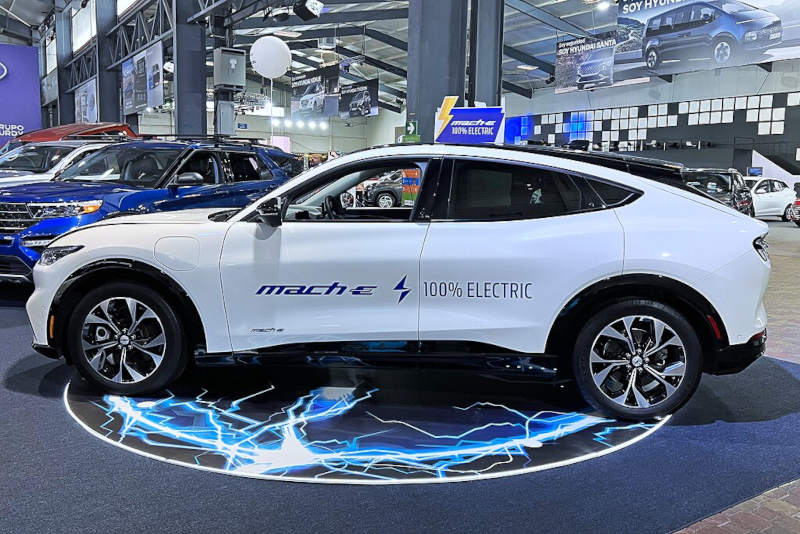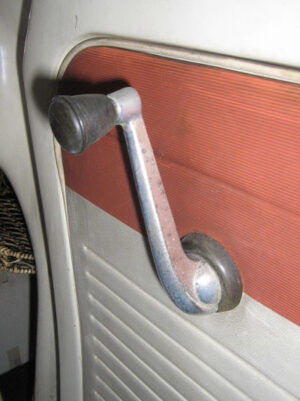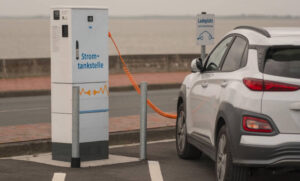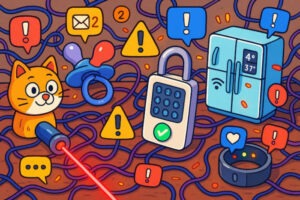The Mustang Mach-E recall isn’t just a glitch—it’s a sign that sometimes, the best solutions are the ones we’ve left behind.

I recently learned that the interior door handles of the Ford Mustang Mach-E are mechanical, while the exterior handles are electric buttons and nothing else, because innovation or something.
I came to discover this symptom of carmaker desperation through the announcement that Ford recalled the Mustang Mach-E. Why? Because thanks to having those buttons and nothing else on the outside, if you lock your wallet or baby inside a Mustang Mach-E and then its battery dies, you won’t be able to reopen the doors. Oh, and if you broke the car windows to reach those unfashionable, yet still working door handles inside, please note that the doors won’t close afterwards.
Luckily, there is an easy, really convenient DIY fix for Mach-E owners until the problem is solved for good, which by Ford’s own statement should be not earlier than third quarter of 2025: always carry with you a portable 12 Volt jump starter, and if the battery dies, hook it up behind an access panel in the front bumper.
From a strictly engineering point of view, there are two things to notice here. One is how stupid it is to throw away something robust and perfectly working (a.k.a
“actual door handles”) for what? Looking new and a 0.00-something reduction in the drag coefficient? The other thing is that it took five years to notice and fix this problem. There’s more, though.
Where is the problem here, exactly?
Unsurprisingly, the problem is in software (the same software that’s eating the world and its cars too), making automobiles stupider and stupider–not to mention more intrusive, expensive, and less “yours”–every year. In this particular case, quoting from the Ford recall notice:
“On your vehicle, in the event of unexpected 12V battery discharge, the front door electronic latches retain their last lock/unlock status. If the driver or front passenger exit the front doors using the mechanical inside release handles, the doors may remain locked when they are closed. This may result in an unexpected lock-out condition for the driver and front passenger without the ability to immediately re-enter the vehicle.”
Advocates of free/open source software, me included, will certainly point out that if all the software aboard the Mustang and other cars were open source, both bugs like this and outright frauds like DieselGate would have been discovered and fixed much sooner. As true as this is, it doesn’t matter. If something is intrinsically stupid, it doesn’t start making sense just because its software is open.
Swiping While Driving
Apart from that, there is something else in this story that caught my attention. Buttons that depend on batteries instead of handles that only depend on your hand are just the latest additions to a long list of highly questionable “features” of modern cars including but not limited to:
- Gesture controls instead of physical buttons around the steering wheel (as I read somewhere on Reddit, “Imagine an Italian driving… System overload all the time”)
- Voice controls that may get confused, especially with kids in the car
- Duplication of services, from navigation to streaming music, that everybody already has and pays for on their phones, in much better forms
- On-screen menus and sub-menus instead of physical controls that would be much faster and much less distracting
This is all stuff that just makes cars more fragile, more expensive to maintain, and in some extreme cases (check out this cartoon), even more dangerous. Ditto for trucks: something is seriously wrong if even the blessed residents of the Land of the Free can only get “symbols of rot” cybertrucks with deal-breaking issues, instead of much more sensible mini-pickup trucks “like the Taliban and ISIS.”
This said, I see all this crap as part and proof of a much bigger trend. Believe it or not, what really triggered my brain while reading the Mach-E horror story is reading, somewhere on Reddit I believe, that…
“This door lock issue could’ve been mitigated with something Ford’s Lincoln luxury division has been doing on cars with electronic door latches for years: Including a key hole in the driver’s door.”
In other words, we’ve reached a point where the simpler features that look “old” but work better, are inside the most expensive cars, not the cheapest ones. Are we smart or what?
Those Shiny Bells and Whistles
All the craziness I’ve mentioned so far seems to me just the car-related part of a general shift to a world where only those who can afford it get to live as all of us “poors” used to live before.
In general, it seems to me that the true luxuries of the 21st century are simplicity and common sense. Where does this thought lead us, as far as cars and their software are concerned? If you ask me, I’d rather have a barebones, 100% closed source car than any car full of free and open source features that don’t do anything genuinely useful.

Cars with state-of-the-art electric engines and batteries, but (for example) manual “window winders” and generally far fewer “smart” features than today, would not just cost less, waste fewer resources, and justify far fewer conflicts and other international abuses.
Even if all their hardware and software were proprietary, such cars would be more open source and free-as-in-freedom than any car on the market today, exactly because, thanks to their simplicity, they would be much simpler to repair, hack, and customize. Do you agree?

Marco Fioretti is an aspiring polymath and idealist without illusions based in Rome, Italy. Marco met Linux, Free as in Freedom Software, and the Web pre-1.0 back in the ’90s while working as an ASIC/FPGA designer in Italy, Sweden, and Silicon Valley. This led to tech writing, including but not limited to hundreds of Free/Open Source tutorials. Over time, this odd combination of experiences has made Marco think way too much about the intersection of tech, ethics, and common sense, turning him into an independent scholar of “Human/digital studies” who yearns for a world with less, but much better, much more open and much more sensible tech than we have today.







I agree that many of today’s cars are loaded with “features” that distract the driver, rather than help them. You should be able to do all of the common tasks by feel, rather than having to look to confirm which button you are pressing or look at a touch screen.
Most people don’t know that the auto market in the U.S. and throughout the world is crashing. Too many complicated cars with features most people don’t need or want, with prices that have risen dramatically over the past 30+ years. Dealers are practically giving away cars and trucks just to get a little bit of money from them to pay the interest and huge debt they are carrying! One video stated that 25% of the dealers in the U.S. would be gone by the end of 2025.
I can remember back in the 1970s I could buy a brand new American car or truck for about $7,000. They are now priced from $40,000-$60,000!
Who needs it? My 2020 Hyundai is paid for as well as my house. NO MORE DEBT!
Got an Enyaq 85/2025 from Skoda/VW MEB platform
Mechanical door handles :-), from memory 10 mechanical buttons.
Still a large menu system more or less logic in structure.
Just one example:
Air con/climate – I want to adjust the fan: 1 physical + selection fan on touchscreen+ adjust fan on touchscreen. Its not good for traffic safety.
Missing an old rotating button for doing this – without ever looking on the panel.
An observation on Facebook: Car owners are discussing about SW versions, SW update, how to reset subsystems by remove a fuse for 2 min etc etc.
Its like small boys(or girls) getting a linux distribution for first time in their life.
I drive a 15 year old Skoda (upgraded from an 18 year old Honda), delightfully un-computery in daily use. Still annoyed that you have to work with Skoda/Volkswagen’s VCDS software to make certain changes to the vehicle, though. Just let me plug in a new cruise control stalk if I want to 😀!